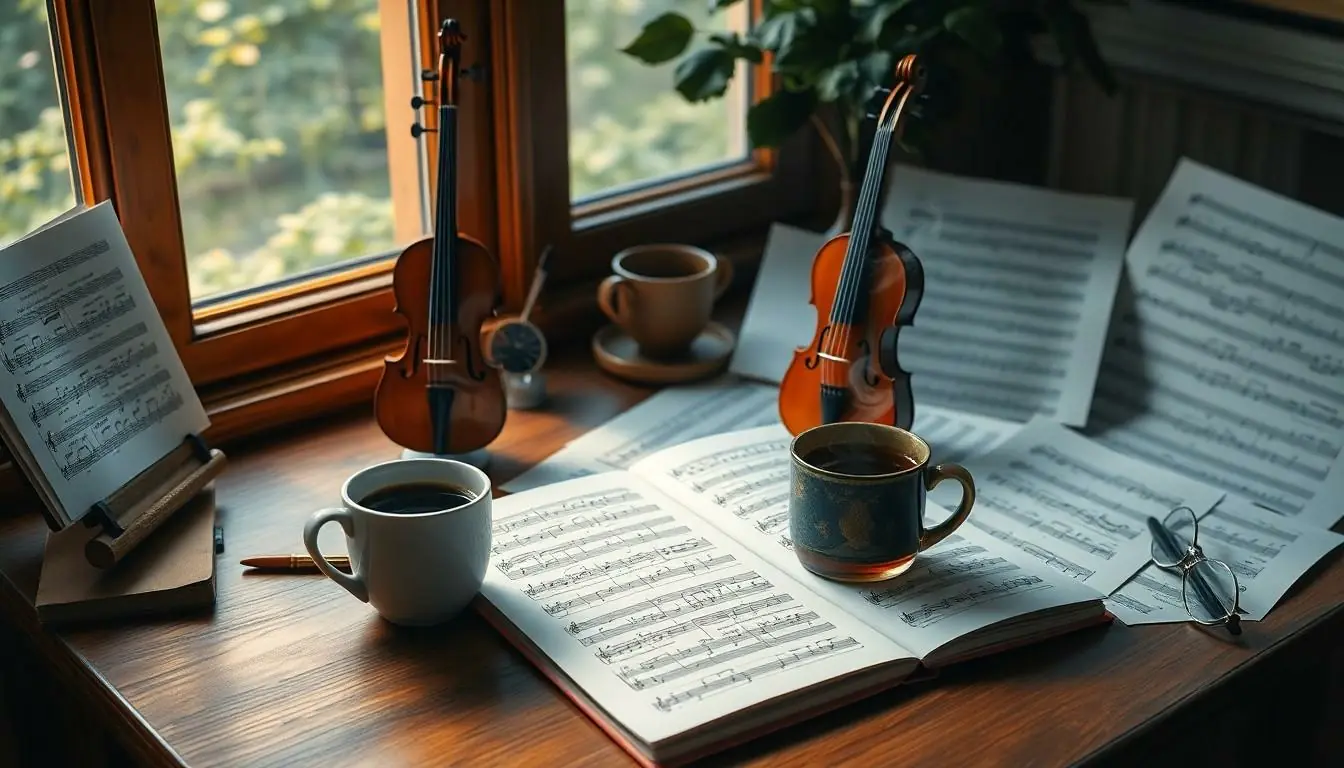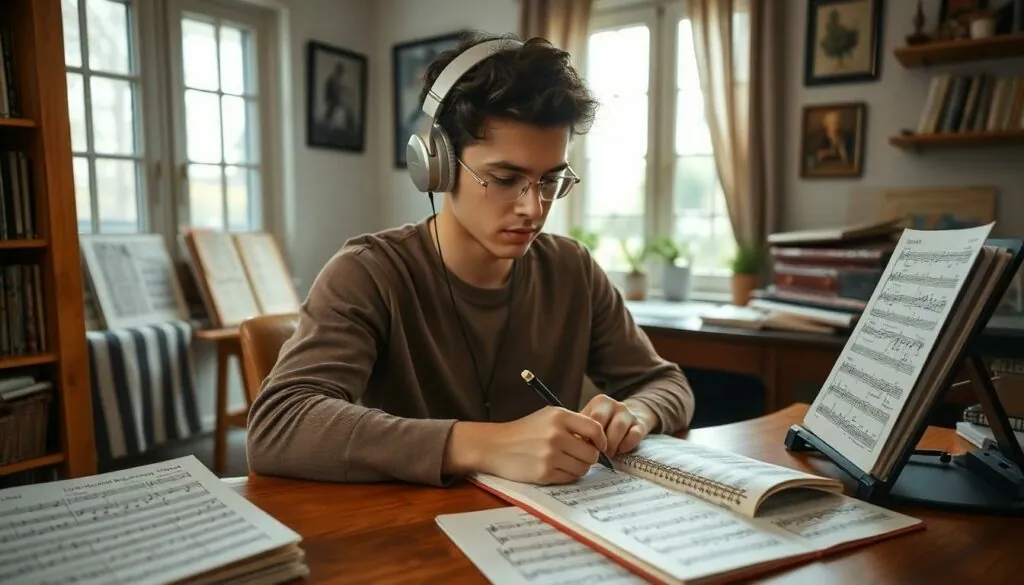Table of Contents
ToggleImagine sitting down to write, armed with nothing but your thoughts and a cup of lukewarm coffee. Suddenly, the perfect symphony of classical music swells in the background, transforming your cluttered mind into a serene oasis of creativity. It’s not just a coincidence; classical music has been the secret weapon of writers for centuries.
From Beethoven’s stirring sonatas to Mozart’s lively concertos, these timeless compositions can boost focus and ignite inspiration. They create an ambiance that drowns out distractions and invites the muse to dance on your keyboard. So why not trade in the silence or the latest pop hits? Embrace the elegance of classical music and watch your writing transform from a chore into a delightful symphony of words.
Understanding Classical Music for Writing
Classical music plays a significant role in enhancing the writing experience. Compositions from renowned composers not only create an inspiring atmosphere but also foster productivity.
Benefits of Classical Music
Classical music offers several advantages for writers. Improved focus emerges as listeners engage with intricate melodies. Familiar pieces can evoke emotional states, sparking creativity. Research indicates that certain compositions, particularly those with a moderate tempo, can enhance cognitive performance, leading to better writing output. A study from the Journal of Neuroscience found that music without lyrics minimizes distractions, providing a calming backdrop. Writers often report feeling less stressed and more motivated when surrounded by this genre.
How Music Affects Concentration
Concentration levels improve significantly with the right musical accompaniment. Classical music influences brain wave patterns, promoting a state conducive to deep work. Exposure to these soundscapes triggers the release of dopamine, which aids in maintaining focus. Studies show that music with a steady beat aligns well with task-related rhythms. Individuals working on creative projects frequently find their concentration waning without musical stimulation. Engaging with classical genres leads to sustained attention and a heightened sense of flow, allowing writers to immerse themselves fully in their work.
Recommended Classical Compositions

Classical music creates a perfect backdrop for writing. Here are some noteworthy compositions to enhance focus and inspire creativity.
Pieces for Focus
Bach’s “Goldberg Variations” captivates with its intricate patterns and structures, boosting concentration. Vivaldi’s “The Four Seasons” delivers engaging melodies that maintain attention throughout long writing sessions. Chopin’s Nocturnes offer a serene soundscape, promoting deep thought and introspection. Additionally, Debussy’s “Clair de Lune” envelops writers in a calming atmosphere, reducing distractions effectively. These pieces, characterized by moderate tempos, align with cognitive rhythms, fostering a productive work environment.
Compositions for Inspiration
Mozart’s “Piano Concerto No. 21” evokes a range of emotions, instilling motivation and creative energy. Tchaikovsky’s “Swan Lake” provides rich orchestration that inspires vivid imagery and narrative ideas. Furthermore, Beethoven’s “Symphony No. 6” envelops listeners in nature’s tranquility, sparking imaginative thoughts. Grieg’s “Peer Gynt Suite” transports writers to mythical landscapes, fueling creativity. Each of these compositions draws the mind into imaginative realms, enhancing the writing process significantly.
Creating the Perfect Writing Playlist
Crafting an ideal playlist enhances the writing experience. Writers should select pieces that complement their creative process.
Tailoring Music to Personal Preferences
Selecting music based on individual taste significantly influences focus. Classical music comes in various forms, from symphonic to chamber. Some may prefer the intricate compositions of Bach, while others enjoy the emotional depth of Chopin. Understanding personal preferences allows writers to design a playlist that fosters concentration and creativity. A range of tempos and dynamics can cater to different writing moods. Writers should experiment with different composers to find what works best for their unique style.
Length and Variety of Selections
Inclusion of diverse pieces strengthens the writing playlist. Longer compositions, like symphonies, provide an uninterrupted auditory backdrop suitable for extended writing sessions. Combining various lengths ensures writers maintain engagement while preventing monotony. Shorter selections can be utilized for quick bursts of inspiration. It’s useful to include pieces that evoke different emotions and stimulate creativity. Varied selections, from Vivaldi’s “The Four Seasons” to Debussy’s “Clair de Lune,” create a dynamic soundscape that enhances productivity and keeps writers motivated.
Tips for Integrating Music into Your Writing Routine
Integrating music into a writing routine can enhance focus and creativity. Following simple tips can make a significant difference in productivity.
Setting the Right Environment
Creating an inviting space for writing encourages immersion in the task at hand. Choose a quiet area where distractions remain minimal. Incorporating comfortable seating and good lighting can improve focus. Curate a specific playlist dedicated to writing sessions, containing preferred classical music pieces. This tailored approach fosters a consistent atmosphere, reinforcing the writing rhythm. Utilize noise-canceling headphones to block out any background noise, enhancing auditory engagement. Establishing a distinct environment signals to the mind that it’s time to focus.
Balancing Music Volume and Distraction
Finding the right volume for music is crucial in avoiding distraction. Adjust the sound to a level that remains soothing but isn’t overpowering. A lower volume allows the music to serve as a gentle backdrop that complements writing. Writers should pay attention to how different music levels affect their concentration; if music becomes a distraction, reducing the volume can help. Experimenting with varying intensities of sound can reveal the ideal balance that promotes focus while preventing interruptions. Striking this balance keeps writers engaged without the risk of losing focus on their work.
Embracing classical music as a writing companion can transform the creative process. The intricate melodies and emotional depth of compositions foster an environment that enhances focus and inspires imagination. Writers benefit from the calming effects of music without lyrics, allowing for deeper concentration and reduced stress.
Crafting a personalized playlist tailored to individual preferences can further amplify productivity. By exploring various composers and styles, writers can discover the perfect soundscape that aligns with their unique writing rhythms. Ultimately, integrating classical music into writing routines not only enriches the experience but also unlocks new levels of creativity and motivation.





